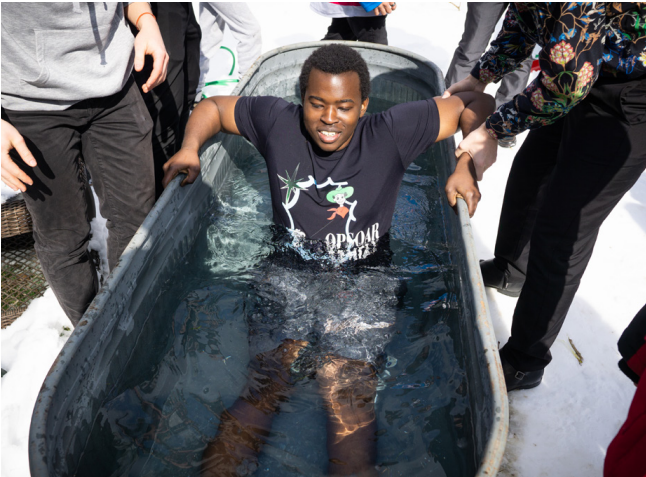
“Let everything that has breath praise the Lord. Praise the Lord.” (Psalm 150:6)
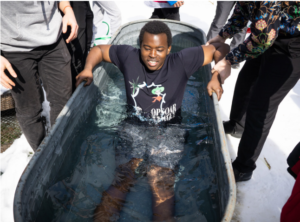
Last Friday night, the congregation gathered at York University for a Singing Devotional! It was a night to remember! We began singing several soulful Kingdom favourites, including “Wade In The Water” and “My Lord.” We were then welcomed by Isaiah and Elizabeth Famurewa, as Isaiah has been leading our Song Ministry for the last couple of years.
After the welcome, some good news sharing followed, led by Kirk and Margie Hamula. But, as we did not have the Church’s sound system, we were at the mercy of the audio equipment built into the room. Thus, the good news sharing was like a daytime talk show, where Kirk and Margie had to bring one microphone into the crowd to hold for those sharing good news. It was a lot of fun!
After the good news, we played a game. My wife, Kelly, had selected five Kingdom songs, as well as five styles of music. The five music styles were rap, opera, country music, heavy metal, and spoken word with interpretive dance. None of the game volunteers knew what was coming! Kelly had them pick a song and a style. The game was that they would have to perform a Kingdom song in the style they randomly selected! They were all hysterical! I won’t ever forget Ashley Cruz’s “Encourage My Soul” rap, Zonya Charles’ country “Glory, Glory,” Divine Uwaifo’s operatic “Sanctuary,” Krikor Mirzoyan’s heavy metal ”This Little Light of Mine,” and Anthony Pacione’s interpretive dance and spoken word of “Be With Me, Lord!”

Following the game and a brief fellowship break, I had the opportunity to preach a short charge on singing. I started by sharing ten scientific reasons why you should sing. According to various studies, singing relieves stress, stimulates an immune response, increases pain thresholds, helps with snoring, improves lung function, creates connections between people, enhances memory, helps with grief, improves mood, and can even improve speaking ability! That said, the only reason a disciple needs to sing is that God says so!
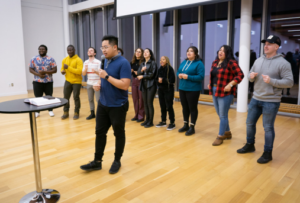
I preached that the Bible commands us to “praise the Lord” 363 times. That’s almost one command for each day of the year! However, the more popular phrase “hallelujah” is only in the Bible four times, occurring in Revelation chapter nineteen. The word “hallelujah” is a Hebrew word. It breaks down into two parts: Hallel and Yah. Hallel means “a joyous praise, or boast,” and Yah is short for “Yahweh” (Jehovah, God). So the word “hallelujah” means “praise the Lord!”
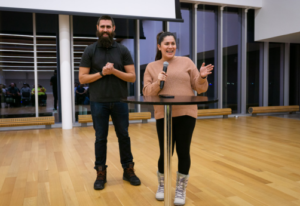
So why was this expression translated differently in Revelation chapter nineteen than in the other 363 instances where “praise the Lord” is used? That’s the question that came to mind when I first studied it. After all, if they mean the same thing, why use a different word? And why only use it in one chapter in the entire Bible?
After further investigation, I learned that it translated differently for an important reason. In all the instances where the Bible translates the phrase as “praise the Lord,” God commands His people to praise Him. However, in Revelation chapter nineteen, John is given a revelation of Heaven. And in Heaven, God’s people will no longer need to be commanded to praise Him. It will happen instinctually because we are so blown away and mesmerized by what we see! Therefore, the overall challenge of my lesson was to “praise the Lord” here on earth because we will eventually sing “hallelujah” in Heaven!
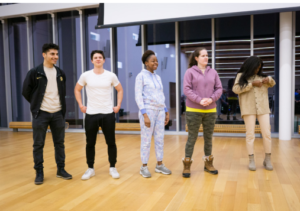
My three points were to 1) Sing Because Your Grateful, 2) Sing Because The Days Are Evil, and 3) Sing Because God Is Watching. Then I closed my lesson by quoting Elvis’ song, “If I Can Dream.” Amazingly, he sang this controversial song during great political turmoil in the 1960s, even though his manager tried forcing him to sing feel-good, politically correct songs. My favourite verse from his song is, “We’re lost in a cloud with too much rain, we’re trapped in a world that’s troubled with pain, but as long as a man has the strength to dream, he
can redeem his soul and fly.” There can be no doubt that music and singing have a profound impact on us, and the entire world!
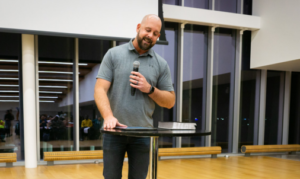
Finally, after the lesson, the Church broke into groups based on a four-part harmony: soprano, alto, tenor, and bass. Each group then learned the vocal notes for the song “Lord of All.” For many of us, it was the first time we knew which parts we should be singing. We worked on mastering our part of the song for about 15 minutes, and then we gathered to sing the song as a congregation. It was awesome! As we sang together, I looked over at my wife, and tears were starting to well up in her eyes. The song sounded so beautiful!
All in all, we were inspired to give our whole hearts to God in singing, understanding that our singing has an impact on ourselves, other people, and most of all, our God up in Heaven! I would like to give a special “thank you” to all of our Song Leaders who strive to lead us in worship every Sunday, and who made our Singing Devotional extra special! Now let’s “praise the Lord!” To God be all the glory!

Evan Bartholomew
